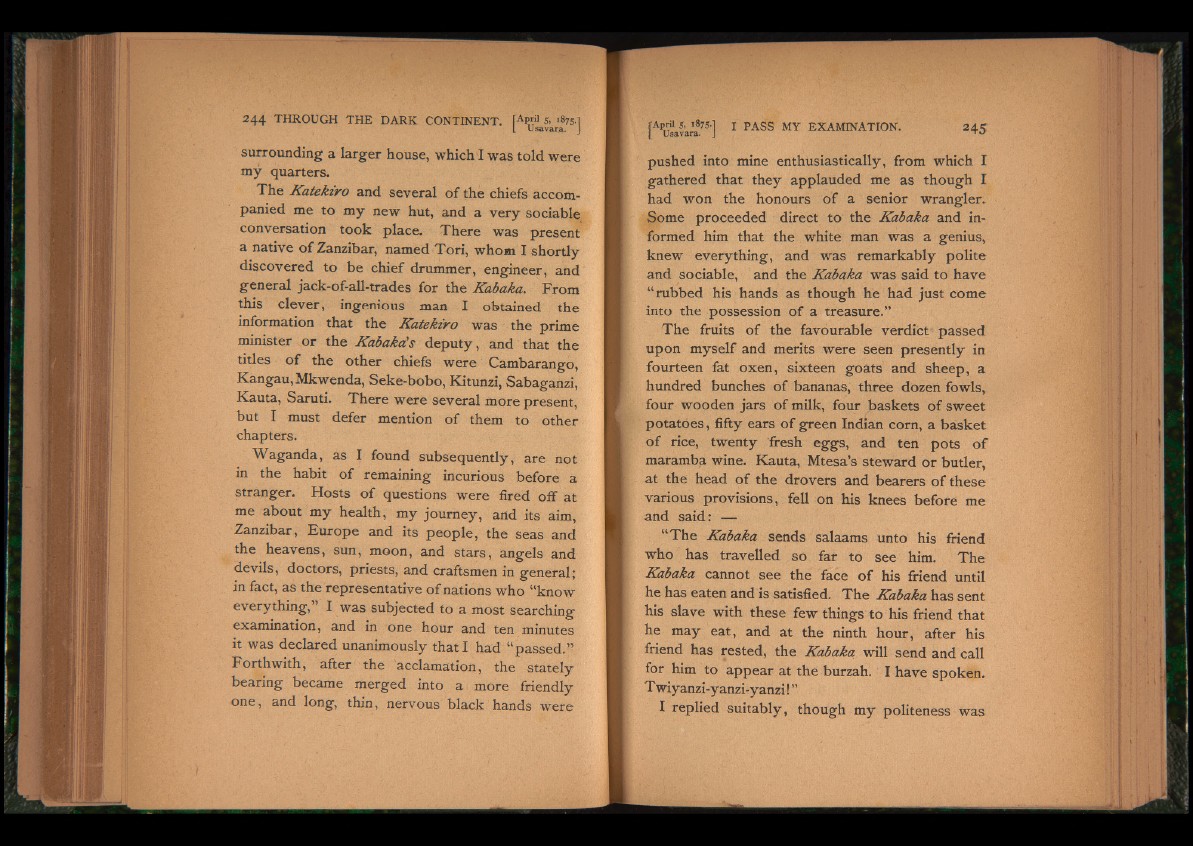
surrounding a larger house, which I was told were
my quarters.
T he K atekiro and several o f the chiefs accompanied
me to my new hut, and a v e ry sociable
conversation took place. There was present
a native o f Zanzibar, named Tori, whom I shortly
discovered to be chief drummer, engineer, and
general jack-of-all-trades for the Kabaka. From
this clever, ingenious man I obtained the
information that the K atekiro was the prime
minister or the Kabaka's d ep u ty , and that the
titles o f the other chiefs were Cambarango,
Kangau, Mkwenda, Seke-bobo, Kitunzi, Sabaganzi,
Kauta, Saruti. There were several more present,
but I must defer mention o f them to other
chapters.
Waganda, as I found subsequently, are not
in the habit o f remaining incurious before a
stranger. Hosts o f questions were fired o ff at
me about my health, my journey, and its aim,
Zanzibar, Europe and its p eople, the seas and
the heavens, sun, moon, and stars, angels and
devils, doctors, priests, and craftsmen in general;
in fact, as the representative o f nations who “know
everything,” I was subjected to a most searching
examination, and in one hour and ten minutes
it was declared unanimously that I had “ passed.”
Forthwith, after the acclamation, the stately
bearing became merged into a more friendly
one, and long, thin, nervous black hands Were
pushed into mine enthusiastically, from which I
gathered that they applauded me as though I
had won the honours o f a senior wrangler.
Some proceeded direct to the Kabaka and informed
him that the white man was a genius,
knew everything, and was remarkably polite
and sociable, and the Kabaka was said to have
“ rubbed his hands as though he had just come
into the possession o f a treasure.”
T h e fruits o f the favourable verdict passed
upon myself and merits were seen presently in
fourteen fat oxen, sixteen goats and sheep, a
hundred bunches o f bananas, three dozen fowls,
four wooden jars o f milk, four baskets o f sweet
p o tatoe s , fifty ears o f green Indian corn, a basket
o f rice, twenty fresh eggs, and ten pots o f
maramba wine. Kauta, Mtesa’s steward or butler,
at the head o f the drovers and bearers o f these
various provisions, fell on his knees before me
and said: —
“ The Kabaka sends salaams unto his friend
who has travelled so far to see him. The
Kabaka cannot see the face o f his friend until
he has eaten and is satisfied. T h e Kabaka has sent
his slave with these few things to his friend that
he may eat, and at the ninth hour, after his
friend has rested, the Kabaka will send and call
for him to appear at the burzah. I have spoken.
T wiyanzi-yanzi-yanzi! ”
I replied suitably, though my politeness was